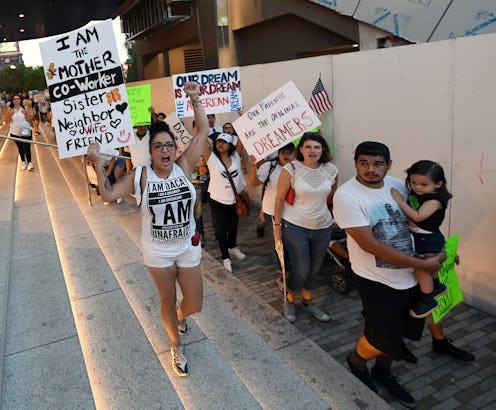News
Dreamers In New Jersey Are Going On A Hunger Strike To Get Congress' Attention

Back in September, President Trump announced his administration would rescind protections for undocumented immigrants brought to the United States as children by ending the Deferred Action For Childhood Arrivals (DACA) program. But since Congress has failed to pass legislation that restores those protections, DACA recipients are taking their efforts a step further. In New Jersey, "dreamers" declared a hunger strike through Thanksgiving to stress the urgency of their situation.
Since it was first signed by Obama in 2012, DACA has shielded approximately 800,000 immigrants who were brought to the United States as children from deportation. Under DACA, these young people are allowed to attend school and work in the country without fear of being detained by law enforcement. Following the Trump administration's decision to rescind DACA, however, the fate of these dreamers is now up in the air. The president has put the onus on Congress to come up with legislation to replace DACA, leaving recipients unsure of their future. And should U.S. representatives fail to act, some "dreamers" could be deported as soon as March 6, 2018.
With this looming deadline in mind, a number of "dreamers" and allies in New Jersey declared a hunger strike the week of Thanksgiving, and organized rallies across the state. If Congress fails to renew DACA, some 22,000 "dreamers" in New Jersey could face deportation. In an email to The Trentonian, Adriana Abizadeh of the Latino America Legal Defense and Education Fund (LALDEF) explained that the protesters are "urging Congress to take action to pass a DREAM Act that would provide a pathway to citizenship for recipients of Deferred Action for Childhood Arrivals (DACA) without expanding funding for immigration enforcement."
The legislation that these activists are pushing is widely referred to as a "clean DREAM Act," referencing President Obama’s original legislative proposal to protect immigrant youth (after his DREAM act failed to pass in Congress, the president introduced DACA, a less permanent measure of protection, through an executive order in 2012.)
Adriana Delgado, a 24-year-old immigrant from Mexico who is participating in the hunger strike, told WNYC that three days without food is a small price to pay "if it means not suffering for a lifetime"; "there will be thousands of families who will have broken dinner tables if nothing is done," she added.
Make The Road New Jersey, the advocacy organization that organized the hunger strike, tweeted that the protest would send a "clear message" that "dreamers are not bargaining chips." Since the hunger strike was announced Monday afternoon, participants have contributed to the conversation using the hashtag #Fast4CleanDREAM.
Back in July, a bipartisan bill that would renew the protections afforded by DACA was introduced by Senators Lindsey Graham and Dick Durbin. The bill — titled the Dream Act of 2017 — would protect dreamers brought to the United States illegally as children, and outline a path for these individuals to obtain permanent resident status in the United States. But Congress has been slow to move on the legislation, prompting heightened worry from the immigrant community.
The hunger strike is just one public call for action that has been carried out in recent weeks as many DACA recipients grow closer to losing their protection. On Nov. 9, hundreds of students gathered in the Hart Senate Building to demand Congress pass a clean DREAM act. Sheridan Aguirre, a representative from United We Dream, the organization that organized the walkout, told The Huffington Post that "when Trump chose to terminate DACA, what he didn't know was he was awakening a sleeping giant," noting that the president only caught the attention of more Americans by announcing he would roll back these protections.
By coming out as undocumented, young people like the ones striking this week in New Jersey are taking enormous risks. But for these immigrants, their best hope is to remain vocal — for now, their fate rests largely in the hands of Congress.